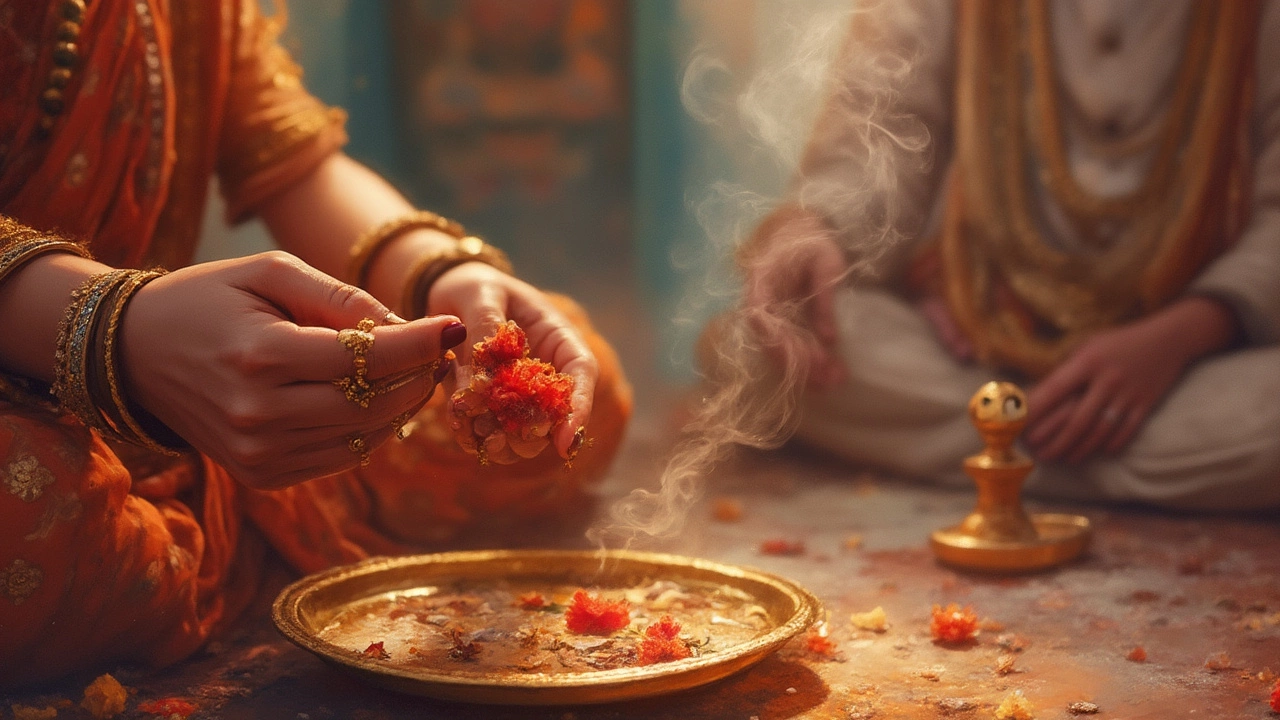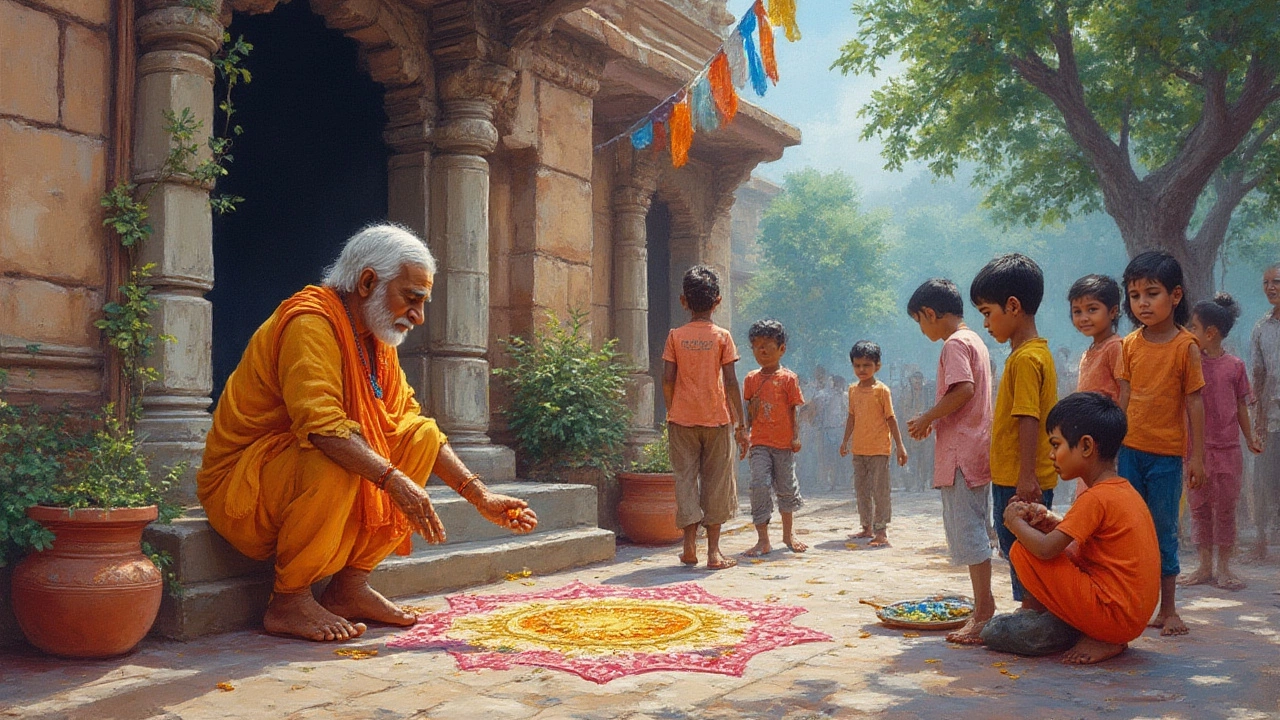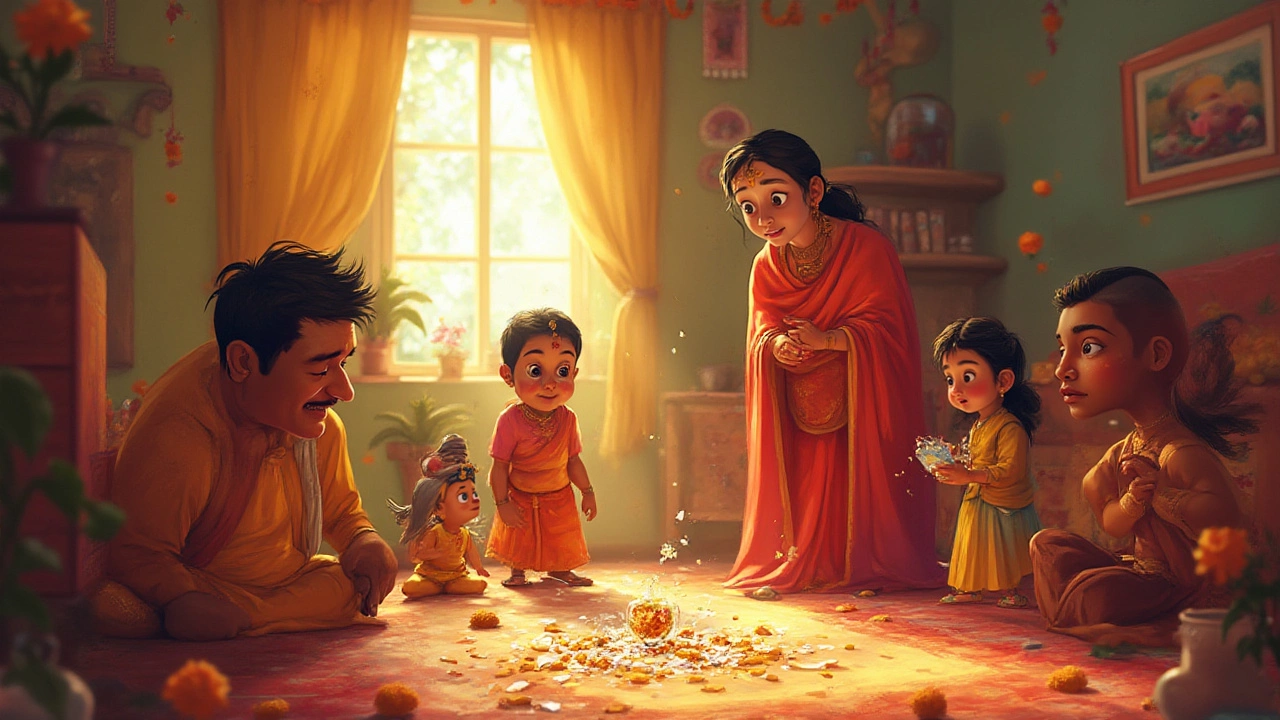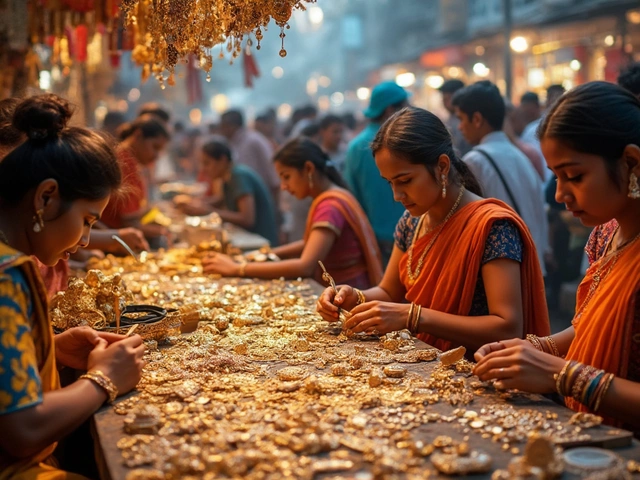Walk into any Indian home where something made of glass shatters, and you’re bound to spot a quick, almost embarrassed glance among family members. You might even catch someone muttering a little prayer. Is breaking glass in Hinduism actually bad luck? Or, could it just as easily bring good news? This simple act of glass breaking, whether it’s a fallen diya or a pair of delicate green bangles, packs a ton of symbolism, stories, and beliefs—often depending on who you ask and where they’re from. The answer isn’t nearly as simple as just “good” or “bad.” Get ready for a look inside a world where even a broken cup has a hidden meaning, and every family seems to have their own version of the story.
The Cultural Weight of Breaking Glass: History, Beliefs, and Regional Spin
Step inside any traditional Indian festival or ceremony, and glass isn’t just a material. It’s woven right into the rituals—think glass bangles on a bride, sparkling lamps during Diwali, or the famous colored glass embedded in temple architecture. In Hindu life, glass objects have always carried a certain charm, but also a fragility that many associate with the delicate balance of fortune.
Now, the thing is, breaking glass in Hinduism doesn’t land in just one, neat box. Some say it draws trouble, while others welcome it as a sign that bad luck has been broken, making space for something better. Curious, right? Discussions with elders reveal stories like, “If a mirror breaks, avoid looking at your reflection—it’s as if you’re splitting your own soul.” In contrast, Ankita always laughs when she remembers her grandmother whispering, “Broken glass? Good! The evil eye has been shattered!” So, glass breaking is both a warning and a blessing, depending on who’s doing the talking.
There are ancient Sanskrit texts that mention glass only in passing, since glass wasn’t widely used in the earliest Vedic rituals. The whole superstition around glass, some scholars say, got really big during the Mughal period when glasswork flourished as an art, finding its way into palaces and temples. The more valuable glass became, the stronger the feelings tied to breaking it. Tableware imported by colonial rulers in the 1700s also turned glass into a sign of status. Suddenly, a broken cup wasn’t just a household accident. It became a signal—sometimes of carelessness, sometimes of something more cosmic.
If you break glass in the northern states like Uttar Pradesh or Punjab, it’s often followed by a bit of fretting. Families there believe broken glass means coming arguments at home or the loss of harmony. But if you go south to Tamil Nadu, breaking a glass at the start of something new—a wedding, a shop opening—carries an upbeat vibe. It’s considered a release valve, letting the old negativity ooze out, so fresh luck can pour in. This dual character shows that Indian traditions are far from monolithic.
Some of these ideas are reflected around the world, not just in Hindu households. For example, Jewish weddings have the famous ritual of breaking a glass to represent the fragility of happiness or remembrance of hardship. But in Hindu tradition, context is everything. What’s broken, when it’s broken, and how it’s handled—these details can flip the meaning entirely.
| Region | Common Belief on Breaking Glass |
|---|---|
| North India (UP, Punjab) | Seen as bad omen—possible quarrels or bad news |
| South India (Tamil Nadu) | Sometimes a good sign—negativity getting removed |
| West India (Maharashtra, Gujarat) | Depends on situation—wedding bangles breaking seen as unlucky for married women |
| Worldwide (Jewish, Western) | Varied—often symbolic of transition or remembrance |
If you collect all the stories, it’s clear: breaking glass isn’t just about the item. It’s about timing, intention, and above all, belief.

Glass Bangles, Rituals, and Real-Life Practices: What Actually Happens When Glass Breaks?
Next time you see a woman slip on bangles during a pooja, don’t just glance and move on. Glass bangles are soaked with symbolism in Hindu rituals. Traditionally, a married woman’s glass bangles are a visual promise of her husband’s health and the continuity of family prosperity. If one breaks on its own, especially a green bangle, her mother-in-law might gasp. The popular take? It’s an unlucky sign, perhaps predicting discord or even ill health. This isn’t just gossip—some families actually perform a quick puja to “remove the dosh,” or negative energy, from the accident.
Bangles come up again in wedding rituals. Hindu brides wear stacks of green and red glass bangles—each one said to represent a wish for happiness and a long, healthy marriage. If any of these glass bangles break before a specific post-wedding day, the older women might insist on a fresh set, sometimes repeating a sweet ritual with turmeric and milk. Talk about taking symbolism seriously! It’s not just empty tradition; the fragile sound of bangles breaking often triggers an emotional response, like something precious just ended.
There’s another side to the story though. In some Gujarati and Maharashtrian communities, if glass breaks during a puja, it’s handled with a straight face. Instead of panic, the belief is, “Whatever evil might have been hanging around has just been shattered.” Instantly, the bits of glass are swept together, often wrapped in old newspaper, and thrown away without looking back. Nobody dares sweep at night though—the old tip goes, “You might sweep away good luck with the broken glass.”
How about daily life? Small kids get an instant scolding if they break a tumbler or glass lamp. “Hold it with two hands, don’t be careless!” is a line most Indian kids hear at some point. But right behind the scolding, an elder might add, “If it broke, maybe it took away a little bit of your bad luck.” It’s this two-layered approach—first the practical lesson, then the superstitious twist. You’ll find these beliefs living side by side, never quite bumping into each other.
Even today, lots of modern couples blend logic and superstition. Ankita, for instance, only insists on replacing broken bangles quickly, never letting them sit in the drawer. She read in a Marathi home magazine that keeping broken glass—especially if it’s jewelry—is just inviting bad vibes. Some urban families have started looking at these customs as a kind of emotional hygiene. Think about it: by sweeping away sharp pieces, they believe they’re brushing away hidden negativity too.
And there’s no one-size-fits-all answer. Some famous temples—like the Chamundeshwari Temple in Mysore—used to use glass bangles as an offering, breaking a small piece as part of the wishes for women without children. The message? Even heartbreak, represented by a snapped bangle, might be turned around if prayed over and left behind at the feet of the goddess.
If you’re actually caught in the act—breaking something right before an exam or trip—chances are someone in the family will urge you to “do a little puja” before heading out, just to be safe.
- First, collect all the broken pieces—never by hand. Use paper or tongs if you’re feeling superstitious.
- Don’t throw away broken glass immediately after sunset. Wait for sunrise.
- If the glass broke during a big day (like a birthday or festival), burn incense afterward for a fresh start.
- Whatever you do, don’t keep broken objects lying around. It’s considered unlucky for both the mind and home energy.

Modern Perspectives, Science vs. Superstition, and Tips for Navigating Your Own Beliefs
The world’s changed a lot, but glass superstitions still slip quietly into daily life, even for the most logic-driven folks. Urban families might scoff at the idea that breaking glass could curse their luck, but you’ll find plenty who still follow a few quiet rules “just in case.” For many, it boils down to the classic battle—what’s the line between tradition and science?
Sure, from a scientific angle, glass breaks simply because it’s brittle. Drop it, tap it wrong, or expose it to quick temperature changes—crack! Yet, when something precious breaks, our brains immediately look for meaning. That’s just humans being humans. One 2017 study by the Indian Council of Social Science Research found that over 65% of urban Hindu families admitted to quietly following at least one Ritual of avoidance (like not keeping broken glass at home) even if they didn’t believe in bad luck. Why? Because these practices carry emotional comfort, and help avoid the nagging feeling that you might have tempted fate.
For anyone struggling to make sense of these customs in 2025, here’s a grounded tip—don’t fight your family if they just swept up the fragments and did a quick aarti of the living room. If it brings them ease, it costs you nothing. But don’t ignore your own common sense either—broken glass can be sharp, so scooping it away immediately is always the right thing, superstition or not.
Wondering about the glass bangles on your wrist? If you’re worried, replace them when they break, but know that their real power is in what they mean to you and how they make you feel. Rituals thrive because they give people a sense of connection—not just to gods, but to family stories, to a larger past, and to hopes for the future. Even as modernization moves forward, the idea that breaking glass shakes up the spiritual energy in a space holds its little corner in the Indian heart, tucked beside Wi-Fi passwords and delivery apps.
At the end of the day, it’s not about whether breaking glass is strictly good or bad. It’s about how you and your loved ones experience it. If sweeping up the fragments is a little ritual that brings laughter and a moment to pause, or if it’s a way to say goodbye to a tough week, then it’s done its job. Everything in Hindu tradition—glass included—asks us to notice the hidden layers in everyday life. Lucky, unlucky, or just a reminder to be more careful, the answer is not set in stone, just like tradition itself.



